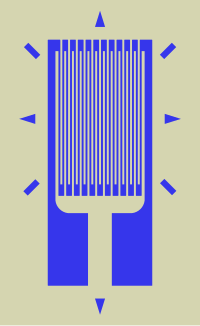
Photo from wikipedia
Flexible strain sensors have attracted tremendous interest due to their potential application as intelligent wearable sensing devices. Among them, crack-based flexible strain sensors have been studied extensively owing to their… Click to show full abstract
Flexible strain sensors have attracted tremendous interest due to their potential application as intelligent wearable sensing devices. Among them, crack-based flexible strain sensors have been studied extensively owing to their ultrahigh sensitivity. Nevertheless, the detection range of a crack-based sensor is quite narrow, limiting its application. In this work, a stretchable strain sensor based on a designed crack structure was fabricated by spray-coating carbon nanotube (CNT) ink onto an electrospun thermoplastic polyurethane (TPU) fibrous mat and prestretching treatment to overcome the trade-off relationship. Our sensor exhibited combined features of high sensitivity in a greatly widened workable sensing range [a gauge factor of 428.5 within 100% strain, 9268.8 for a strain of 100-220%, and larger than 83982.8 for a strain of 220-300%], a fast response time (about 70 ms), superior durability (>10 000 stretching-releasing cycles), and excellent response toward bending. The microstructural evolution of CNT branches extending from two edges of the cracks and the excellent stretchability of TPU fibrous mats are mainly related to the remarkable sensing properties. Our sensor is then assembled to detect various human motions and physical vibrational signals, demonstrating its potential applications in intelligent devices, electronic skins, and wearable healthcare monitors.
Journal Title: ACS applied materials & interfaces
Year Published: 2019
Link to full text (if available)
Share on Social Media: Sign Up to like & get
recommendations!